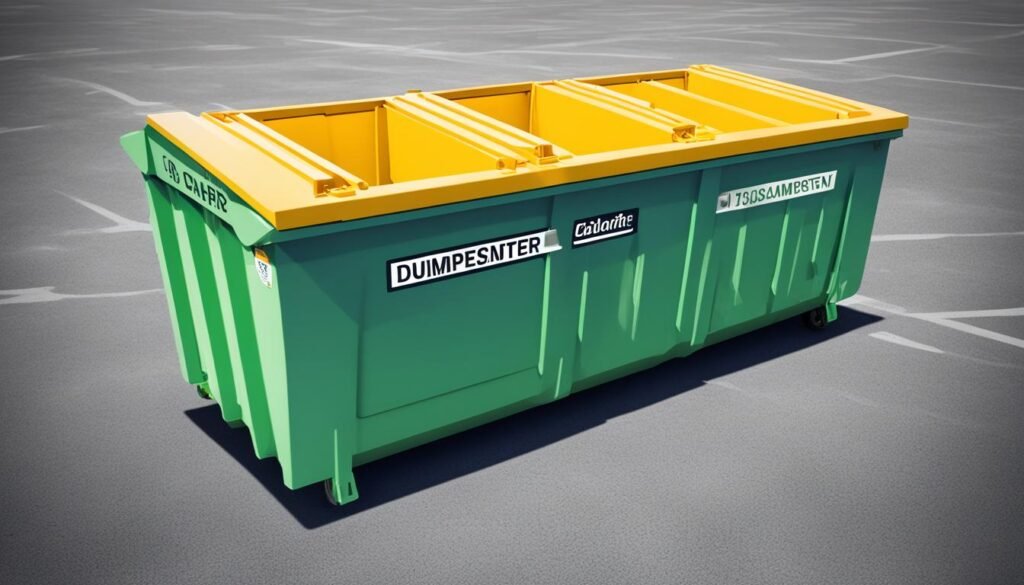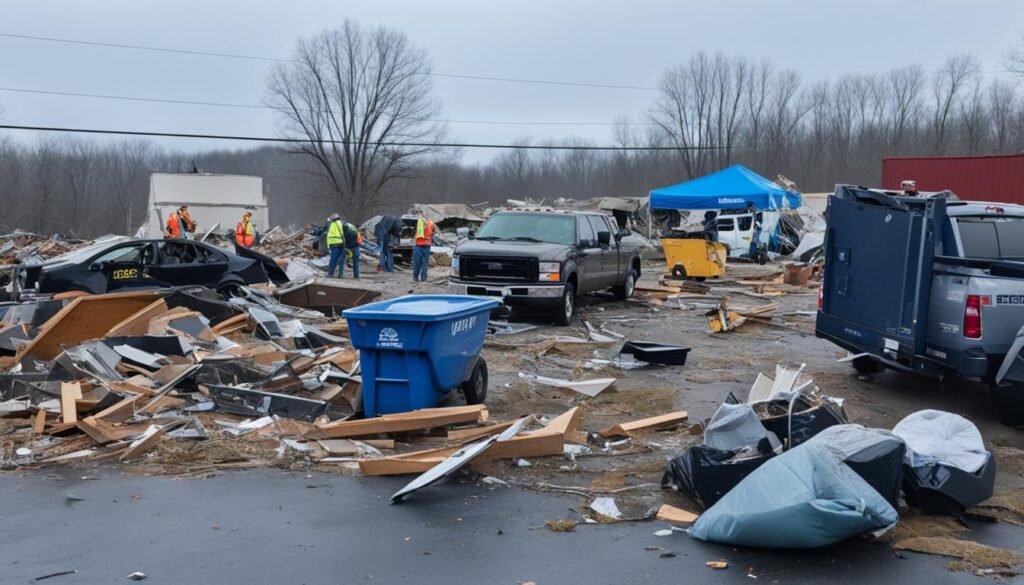Did you know a lot of waste piles up after a disaster? This is a big problem for communities. The cleanup efforts needed to tackle residential and commercial waste are huge.
Dumpster rental services are here to help. They make cleaning up faster and easier. These services are convenient, safe, and cost-effective. They play a big part in helping communities rebuild.
Having a plan with a dumpster rental service is important. It helps ensure a quick and organized response when disasters strike. Following specific guidelines helps handle waste efficiently. This supports the recovery process.
Key Takeaways:
- Dumpster rental services are essential for managing the large volume of waste generated during and after a disaster.
- They offer convenience, safety, cost-effectiveness, and versatility, making them an invaluable component of post-disaster cleanup.
- Strategic planning and proactive preparation with dumpster rental services are crucial for a swift and organized response to natural disasters.
- Adhering to best practices ensures optimal use of dumpster rentals, streamlining the cleanup process.
- By utilizing dumpster rental services, communities can contribute to the overall recovery and rebuilding in the aftermath of a disaster.
The Benefits of Dumpster Rental for Disaster Clean-Up
Dumpster rental services are crucial for efficient debris removal after disasters. They help in effective waste management. These services are essential in cleaning up and recovering from disasters.
“Dumpster rental services provide numerous benefits for disaster clean-up efforts.”
Convenience: Dumpster rentals make disposing of debris easy and hassle-free. They’re placed directly at the clean-up sites. This helps save time and allows you to concentrate on other cleanup tasks.
“One of the primary advantages of dumpster rental services is the convenience they offer.”
Safety and Compliance: They ensure hazardous materials are disposed of safely. This helps protect people and the environment. Following rules, these services keep the cleanup process safe and compliant.
Cost-Effective: Dumpster rentals are a budget-friendly choice for disaster cleanup. They have a one-time fee, avoiding unexpected costs. This makes financial planning easier.
Versatility: They offer different sizes for various needs. Whether for home, business, or garden trash, there’s a suitable option. Dumpster rentals can take care of all debris types.
Efficiency: These services make waste removal quicker and more organized. By having a specific place for trash, the cleanup becomes more effective. This helps communities focus on rebuilding.
Infographic: Dumpster Rental Sizes

| Dumpster Size | Dimensions | Capacity |
|---|---|---|
| 10-Yard Dumpster | 12 ft. long x 8 ft. wide x 3.5 ft. high | Equivalent to 4 pickup truck loads |
| 20-Yard Dumpster | 22 ft. long x 8 ft. wide x 4 ft. high | Equivalent to 8 pickup truck loads |
| 30-Yard Dumpster | 22 ft. long x 8 ft. wide x 6 ft. high | Equivalent to 12 pickup truck loads |
| 40-Yard Dumpster | 22 ft. long x 8 ft. wide x 8 ft. high | Equivalent to 16 pickup truck loads |
Picking the right dumpster size is key for effective waste management during disaster cleanup. The infographic and table show the sizes available and their uses.
Best Practices for Using Dumpster Rental in Disaster Relief
Using dumpster rental services well is key in disaster relief. These practices help in managing debris and waste. They aid in cleaning up and recovering after disasters.
Assess and Plan for Debris Collection
Before getting dumpsters, know the type and amount of debris to expect. This helps choose the right size and number of dumpsters. You can avoid overflow and meet disposal needs this way.
Strategic Placement for Easy Access
Put dumpsters in places that are easy to get to. They should not block recovery work or traffic. This makes debris removal and disposal smoother and keeps things efficient.
Encourage Waste Segregation
Telling people to separate waste is important for good recycling and disposal. Teach the community to sort recyclables, hazardous materials, and regular trash. This boosts recycling efforts and reduces disaster’s environmental harm.
Collaborate with Local Authorities
Working closely with local officials and disaster teams is vital. Stay in touch to coordinate cleanup efforts. This ensures strategies for debris removal fit within local rules and help the cleanup go well.
Community Education on Dumpster Usage
Educating people on proper dumpster use helps prevent misuse. Tell the community what can go in the dumpsters. This makes waste management more effective and helps speed up cleanup.
Monitor and Manage Dumpster Usage
Keep an eye on how full dumpsters are to avoid overflow. Set up regular pickups. Staying on top of dumpster use makes debris collection run smoothly. This minimizes delays in waste management.
Following these practices makes managing debris in disaster relief more effective. Planning, working with local authorities, and educating the community are key. They help make the cleanup organized and efficient.

Conclusion
Recovering from a disaster takes a lot of work. Fast and effective debris removal is crucial. Dumpster rentals help make the cleanup and rebuilding process quick and effective.
Dumpster rental services offer convenience, safety, and cost savings. They help you manage the cleanup after a disaster. This saves time and effort.
It’s important to plan ahead and follow best practices when using dumpsters. Place them strategically, separate different kinds of waste, and work with local authorities. These steps are vital.
Choosing dumpster rentals and planning carefully can speed up recovery. It helps manage waste and debris efficiently after a disaster. This leads to a faster and more organized path to rebuilding.
